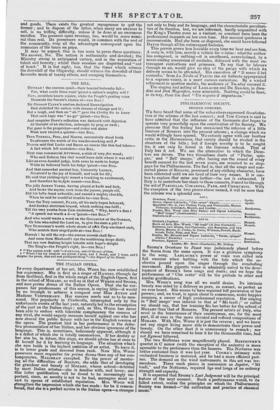THE ITALIAN OPERA.
IN every department of her art, Mrs. WOOD has now established her supremacy. She is first as a singer of HANDEL (though far from faultless), first in the whole range of the English Opera, first in the school of MOZART, as well as in that of WEBER. and SPOHR, and now prima donna of the Italian Opera. That she far sur- passes her predecessors of this season, is saying little—it would be no triumph to achieve a conquest over Miss AYTON and Madame VESPERMANN. Her success needs not so to be mea- sured. Her popularity in Cinderella, interrupted only by the unfortunate events of the last year, naturally led to the resumption of the part on the Italian stage ; and, as Mrs. WOOD has never been able to endure with tolerable complacency the success of any rival, she would eagerly measure herself against one who has now shared the public favour with her in the English version of the opera. The greatest blot in her performance is the defec- tive pronunciation of her Italian, and her obvious ignorance of the language. This is, sometimes, ludicrously apparent, although it is a defect of which she is totally unconscious. If her destiny or her aim be, in future, this stage, we should advise her at once to fit herself for it by learning its language. The situation which she now holds is the highest ambition of an artist. To leave it, is to lower grade and descend from rank. Now Mrs. WOOD possesses more requisites for prima donna than any of her con- temporaries, MALIBRAN excepted. To the power of master- ing all the difficulties of ROSSINI, she adds that of developing the grandeur and beauty of MOZART, whose school—detested by most Italian artistes—she is familiar with, and loves ; and this latter qualification will be found to be increasingly im- portant, since, as novelty is not to be had, managers must re- vert to operas of established reputation. Mrs. WOOD will strengthen the impression which she has made : for be it remem- bered, that she is a perfect novice in the Italian opera—a stranger not only to Italy and its language, and the characteristic peculiari- ties of its theatres, but, we are informed, hardly acquainted with the King's Theatre even as a visitant, so constant have been the professional demands on her own time. Her musical quickness is inconceivable. Had she been so disposed, she could have followed DAVID though all his extravagant fooleries. This person grows less loveable every time we hear and see him. A song is, with him, merely a vehicle for volatas : what the author has composed, is nothing—it is smothered, overwhelm5ed, by a never-ending succession of roulades, delivered with the most ex- travagant contortions and grimaces. To say that he labours through an air, would give no idea of the pangs with which its delivery seems to be attended. His execution of " 11 soave it bel contento," from La Niobe of PAC1NI (an air hitherto appropriated to a soprano voice), is a most curious caricature. By a wicked refinement in sportive malice, the audience of Tuesday encored it. The singing and acting of LABLACHE and DE BEcNis, in Dan- dini and Don Magnifico, were admirable. Nothing could be finer, in its way, than the duet "1.1n segreto d' importatiza."


























 Previous page
Previous page